![]() Do you enjoy taking things apart to see how you can make them even better? Do you care about creations that not only do a job, but help people or the planet?
Do you enjoy taking things apart to see how you can make them even better? Do you care about creations that not only do a job, but help people or the planet?
What if we told you there’s a degree that studies just this?
Well there is, and it’s called environmental engineering.
Environmental engineering is the branch of engineering that looks at products that are currently made (or going to be made), and seeks to determine how to make those products less harmful to the environment (and to people).
Environmental engineering is almost as old as civilization. In fact, some of the earliest engineering projects included thinkers pushing for the consideration of how this engineering project would affect those working on it and the environment.
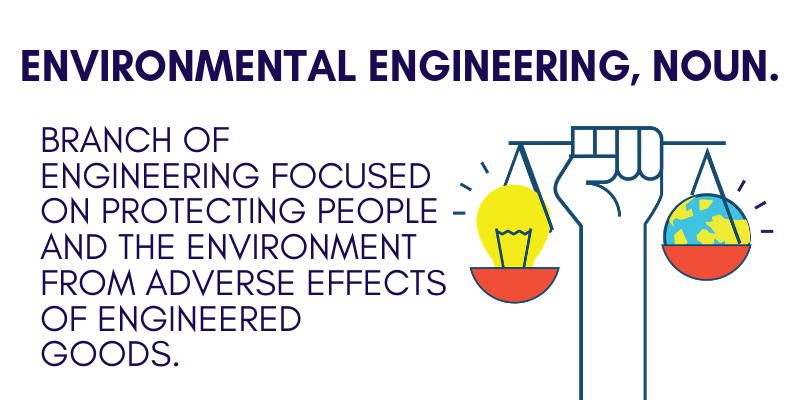
The dawn of modern environmental engineering occurred in mid-1800’s. Overcrowded London was — at the time — home to a “great stink” from sewage being dumped into the Thames. This smell was such a nuisance that it caused Parliament to move their meeting spot. On a more serious note, the prior sewage situation caused regular outbreaks of illness and disease like Cholera. To aid in this situation a series of engineers were called together to minimize the environmental impact of the then present sewage system. Thus the first large scale municipal waste water system was born.
Today environmental engineers work in a diverse range of settings and products. From paper product facilities, to consulting jobs, to the creation of new products that come into contact with babies or the elderly. Environmental engineers work in private industry, research, for think tanks, for public entities, and in self-employed capacities.
There aren’t as many environmental engineers as other popular forms of engineering. And as we collectively push our attention towards ways in which we affect the planet, environmental engineers are in greater demand than ever.
Here at DegreeQuery, we’ve covered a wide range of degrees and the jobs that can come with them. We’re pleased the contents of our guide on what you can do with an environmental engineering degree below.
Table of Contents
- What Environmental Engineering Degrees Are Available?
- Can I Gain an Environmental Engineering Degree Online?
- How Do I Gain Admission to an Environmental Engineering Degree Program?
- What Can I Do With a Degree in Environmental Engineering?
Don’t see what you were looking for? Be sure to check out DegreeQuery’s related resources below:
- How much Science is in an Environmental Engineering Degree?
- What are the Fastest Schools for a Master’s Degree in Environmental Engineering?
- What is the Difference between a Degree in Environmental Science and Environmental Engineering?
- What is a Bachelor’s Degree in Environmental Engineering?
- What Is the Benefit of a Civil Engineering Degree Vs an Environmental Engineering Degree?
- What Classes Will I Have to Take for a Degree in Environmental Engineering?
- How Advanced Does My Degree in Environmental Engineering Need to Be to Get a Good Job?
- What Is the Difference Between a Degree in Agricultural Engineering and a Degree in Environmental Engineering?
- What Can I Do With an Environmental Studies Degree?
- What Degree Do You Need to Be a Civil Engineer?
- What Can I Do With an Aeronautical or Manufacturing Engineering Degree?
- How advanced a Degree do I need for a Career in Environmental Science?
- What is the Wage Potential with a Degree in Environmental Science?
- What Can I Do With a Chemical Engineering Degree?
- What Can I Do With a Civil Engineering Degree?
- What is a Degree in Environmental Nutrition?
- What are the highest paying Jobs in Environmental Science?
- How fast can I earn a Master’s Degree in Environmental Science?
- What is a Bachelor’s Degree in Environmental Studies?
- What is the Benefit of a Degree in Environmental Science vs. Environmental Design?
- What Can I Do With An Engineering Degree?
- What Is the Benefit of a Health and Safety Engineering Degree Vs an Occupational Health and Safety Degree?
- What Are the Highest Paying Jobs With a Degree in Civil Engineering?
- What Are the Highest Paying Jobs in Engineering Technology?
- What Classes Will I Have to Take for a Degree in Agricultural Engineering?
- What Classes Will I Have to Take for a Degree in Chemical Engineering?
- What Classes Will I Have to Take for a Degree in Nuclear Engineering?
- What Industries Have the Greatest Demand for a Degree in Engineering?
- What Is the Job Outlook Like With an Engineering Degree?
- What Is the Demand for a Degree in Engineering Technology?
- What Are the Benefits of Pursuing a Degree in Civil Engineering?
- What Is the Demand for an Associate’s Degree in Engineering?
- How Advanced Does My Degree in Engineering Technology Need to Be to Get a Good Job?
- What Is the Demand for a Degree in Engineering?
- What Engineering Degrees See the Largest Wage Differences?
- What Classes Will I Have to Take for a Degree in Civil Engineering?
What Environmental Engineering Degrees Are Available?
Degrees related to environmental engineering are available at the associates through doctoral levels. The primary “entry-level” degrees for practicing in the field, however, are at the bachelor’s and master’s degree levels. These degree levels are also the most commonly seen in university settings.
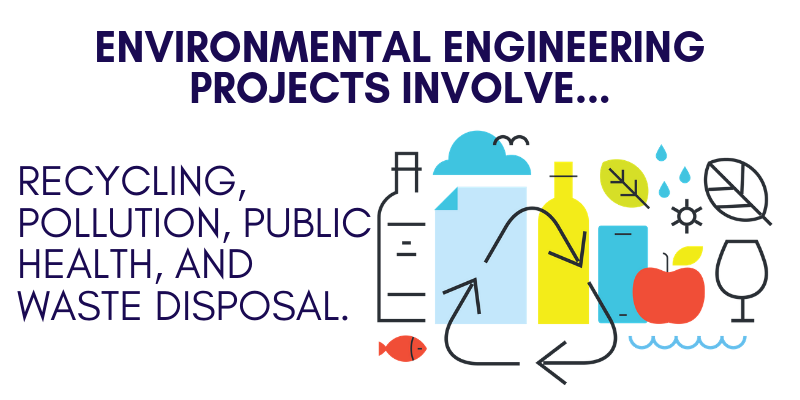
At the associates level degrees in civil environmental engineering technology help to prepare students for support roles in civil and environmental engineering settings. This often applied technology degree can help prepare graduates to work in inspection and preparation of sites, advising teams of construction workers, and helping to draft up plans and proposals.
While the pairing of civil engineering and environmental engineering may seem odd, keep in mind that many civil engineering projects have the largest impact on the environment. Additionally, many governmental construction efforts are under the most regulation regarding what they may or may not do to the environment. This makes environmental analyses important for the building of bridges, roads, airports, ports, railroads, and more.
Associates in civil environmental engineering generally require 60 credit hours — which takes many students about two years to complete. Many programs are transfer programs, that allow students who successfully complete the program automatic entry into the last two years of a four year program at a partner institution.
Students within associates degrees are required to start their study with general education requirements. General education requirements are meant to ensure that students within 2-year degree programs are exposed to a wide range of college-level disciplines, are well rounded thinkers, and hold the basic skills that employers expect of college graduates.
Common general education requirement courses within an associates degree include:
- English Literature and Composition
- Data Literacy
- Computing
- College Mathematics
- Natural Sciences
- Social Sciences
- Liberal Arts
- Ethics or Religion
- Physical Education
- Arts
- Among Others
As students progress through their general education courses, they will begin to take major courses in civil environmental engineering. Some of the most common courses within this academic discipline at the associates level include:
- Environmental Science
- Hydraulics
- Material Strength and Statics
- Mechanics of Soil
- Computer-Aided Design Techniques (CAD)
- Environmental Ethics and Regulations
- Hazardous Material Management
At the bachelor’s level students can begin to take coursework that may land them a position as a full-fledged environmental engineer. While environmental engineering degrees aren’t as common as say electrical or mechanical engineering degrees, many universities now offer them. In fact, there are over 160 bachelor’s in environmental engineering degrees in the United States today.
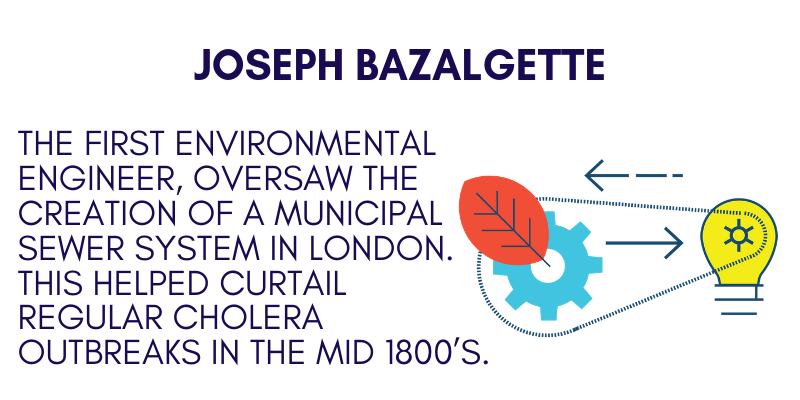
Just as students are expected to take general education requirements at the associates level, so too must students complete related courses at the bachelor’s level. Once students have worked through some of their general education requirements, they may then being major courses. At the bachelor’s level, environmental engineering major courses are likely to include:
- Environmental Engineering Foundations
- Engineering and Science of Environmental Engineering
- Project Management
- Biology
- Chemistry I and II
- Organic Chemistry
- Modeling on Computers
- Engineering Statistics and Probability
- Fluid Mechanics
- Professional Communication for Engineering
- Statics
- Geology
- Hydraulic Engineering
- Calculus I and II
- Differential Equations
- Physics
- Thermodynamics
- A capstone or Thesis Project
- Electives
At the master’s level students can begin to join the ranks of true experts within the field of environmental engineering. At this level of study, students will construct a master’s thesis, which is a hundred plus page document detailing current high-level research within their field of study. Students pursuing a master’s degree within a Ph.d. program may also help to instruct courses or work as teaching assistants.

Master’s in environmental engineering degrees typically require 2 years of study with some programs allowing students to choose a specialization in one area of the field of study.
While programs and specializations will provide varying course options, a typical selection of courses may include:
- Organic Chemistry for the Environment
- Fundamentals of Microbiological Processes
- Aquatic Chemistry
- Treatment Processes for Physical/Chemical Systems
- Watershed and Lake Management
- Chemical Modeling for the Environment
- Management of Water Quality
- Reuse of Wastewater
- Environmental Analysis
- Transportation of Chemicals in the environment
- Chemical Modelling in the Environment
- Chemistry of the atmosphere
- Management of Water Quality
- Physical Hydrology
- Modeling of air quality
- Air Pollution Control
- Energy Infrastructure
- Management of Air Resources
- Environmental Risk Assessment
- Pollution in Communities
- Chemistry of Pollution
- Labs
- A Thesis or Capstone
At the doctoral level there are two primary degree paths available to environmental engineering students:
- A doctor of philosophy (Ph.D.) in environmental engineering
- And a doctor of engineering (D.Eng.) in environmental engineering
While these courses of study can be quite similar (depending on the program), typically a Ph.D. is a research doctorate, while a D.Eng. is a professional doctorate. The key difference between these degree types is that research doctorates tend to focus more on two elements:
- The preparation of the next generation of college-level educators within a field
- The support of original research by students in the form of a dissertation
A dissertation is a several hundred page document of original research by a doctoral candidate. In theory a dissertation should be of high enough quality to be published in a peer-reviewed journal. Though it does not have to bepublished in order for a doctoral candidate to graduate.
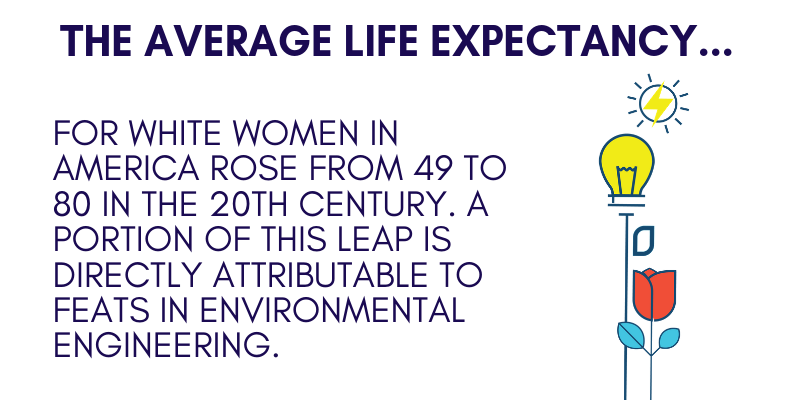
Professional doctorates, on the other hand, often require less years of study and are more centered around skills that directly translate to a role in industry or governmental positions. This is not to say that original research does not occur in D.Eng. programs, and some do require a dissertation. But if you’re looking for a program that is more likely to focus on career readiness with (potentially) less research, then a D.Eng. may be the proper path for you.
As with most doctorates, students have the ability to specialize in more ways than any other degree level. Doctorates in environmental engineering are no different. With students focusing on a wide range of issues including:
- Wastewater treatment
- Water Pollution
- Air Pollution
- Sound Pollution
- Pollution and Community Dynamics
- Transport of Waste
- Management of watersheds
- And many other issues
Can I Gain an Environmental Engineering Degree Online?
While a great deal of environmental engineering work is in the field, that doesn’t mean that foundational science and engineering courses need to be. A range of associates, bachelor’s, and master’s degrees in environmental engineering can be completed 100% online. While many doctoral programs are offered in a hybrid format that require some in-person visits.
Just because degrees are offered online doesn’t mean that you should jump right into to pursuing an online degree, however. While millions of students have excelled online, there are definite trade offs, and students should evaluate what type of learner they are, and personal restrictions that may make in-person or online a solidly better choice.
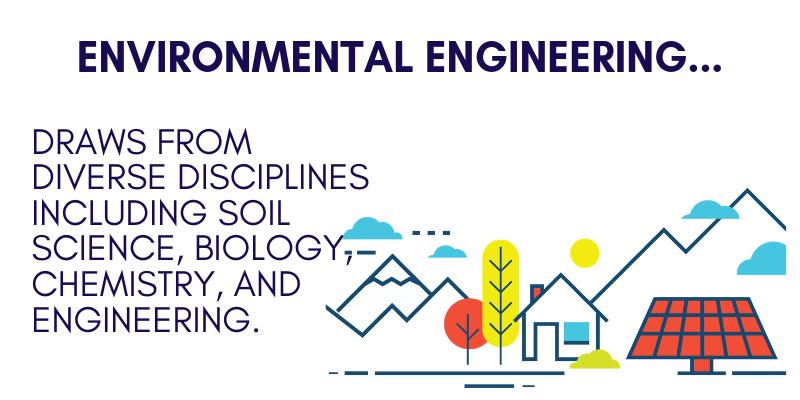
To aid in this decision, we’ve outlined some of the most common good and bad things about online education below.
Selling Points of Online Programs in Environmental Engineering
- No need to move or change (/quit) your job
- Lower fees than in-person programs
- You get the same degree
- Engineering employers are used to online degrees
- Support services for online degrees are growing
- Online programs are often made for adult learners
Down Sides of Online Programs in Environmental Engineering
- Less access to field work-centered education
- Harder to get to know classmates and professors
- Less access to support services and networking events
- Requires more of a “self-starter” attitude
How Do I Gain Admission to an Environmental Engineering Degree Program?
Environmental engineering degrees have similar admissions requirements to other degrees at comparable degree levels with an exception for a master’s in environmental engineering.
At the associates level, students looking at degrees in community college settings are often presented with “open admission” situations. In these arrangements, the main requirement for entry into a program is that a student is in-district (or in-state) and that they hold a high school diploma or equivalent. Students then preserve their open enrollment status by keeping their associates-level course grades above a certain level.
In the event that associates programs are not open enrollment, admissions processes are often similar to those of bachelor’s degrees.
At the bachelor’s degree level, some state universities do offer open admission. A vast majority of schools, however, require students to submit standardized test scores such as the ACT or SAT, high school transcripts, and admission essays. A small minority of schools may also require interviews.
At the master’s level, students may gain entrance into programs with a GRE standardized test score, a resume, mission statement, and undergraduate transcripts. Additionally, some professional-centered program may allow admission based almost solely on professional experience.
Doctoral programs may be entered by students who already hold a master’s degree or those with “just” a bachelor’s. Students entering a doctoral program with a bachelor’s degree only will receive their master’s degree “en route” to their doctoral degree once they have completed the requisite amount of coursework and a master’s thesis.
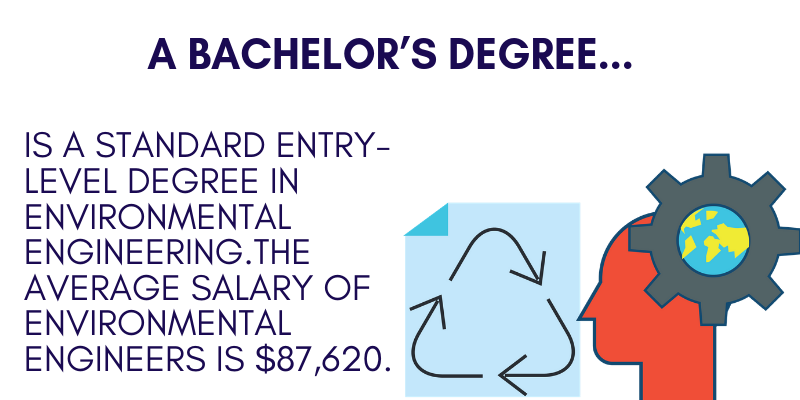
If students are entering a research-centered doctoral program, they should reach out to professors who share their research interests and ask if they are “accepting students.” Within research programs, research professors typically oversee the student research of a handful of students, and popular professors can run out of mentee room quickly.
What Can I Do With a Degree in Environmental Engineering?
As a primarily professional degree, environmental engineering degrees typically prepare students to practice as environmental engineers. With this said, being an environmental engineer can mean many different things depending on your focus area, degree level, and employer.
With an associates degree in civil environmental engineering, students may be prepared to become surveyors, research assistants, grant writers, or work in other support roles within an engineering firm.
Surveyors are important to environmental engineering projects as they obtain detailed information about the physical location of an engineering project. In environmental engineering terms this can include measures of soil, water, or air pollution, as well as schematics for a project’s plans for removing hazardous waste or materials. Surveyors should also be knowledgeable with CAD software for drawing up schematics.
While pay may vary depending on experience, employer, and location in which you work, surveyors with associates degrees make an average of $47381. Top pay rates rise well about $70,000 a year.
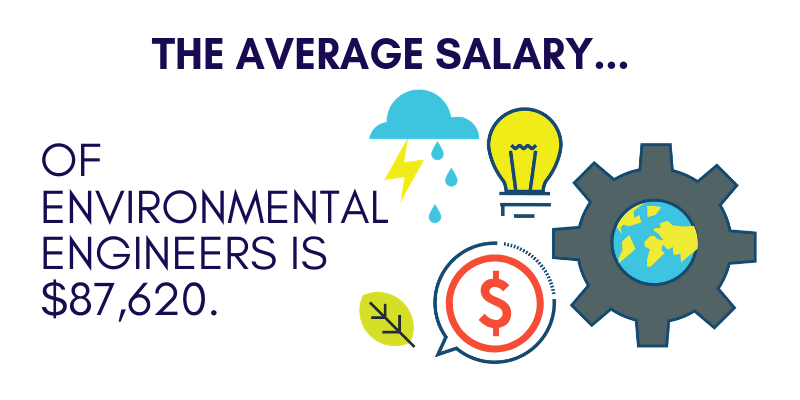
Environmental engineers work in consulting firms, engineering firms, for the Army Corps of Engineers (and other governmental engineering agencies), for non-profits, in research settings, and more.
While not every engineering project employs an environmental engineer. Most large engineering firms or public engineering groups employ at least a handful.
Day-to-day activities of environmental engineers will vary based on where they work. Some researchers teach courses and work on research projects. Researchers within environmental engineering look at all sorts of engineering projects. Some compelling research projects we came across when writing this guide include studying how methamphetamine becomes embedded in engineered furniture, as well as how tiny creatures filter the water we drink.
For environmental engineers who don’t work in research settings, they will likely help with the surveying of locations, run tests and present proposals for keeping projects more environmentally friendly, and educate coworkers about ways to engineer with less environmentally toxic outcomes.
While the average salary of environmental engineers varies by experience, education level, and employer, the average nationwide is presently $64,586.
Don’t see what you were looking for? Be sure to check out DegreeQuery’s related resources below:
- How much Science is in an Environmental Engineering Degree?
- What are the Fastest Schools for a Master’s Degree in Environmental Engineering?
- What is the Difference between a Degree in Environmental Science and Environmental Engineering?
- What is a Bachelor’s Degree in Environmental Engineering?
- What Is the Benefit of a Civil Engineering Degree Vs an Environmental Engineering Degree?
- What Classes Will I Have to Take for a Degree in Environmental Engineering?
- How Advanced Does My Degree in Environmental Engineering Need to Be to Get a Good Job?
- What Is the Difference Between a Degree in Agricultural Engineering and a Degree in Environmental Engineering?
- What Can I Do With an Environmental Studies Degree?
- What Can I Do With an Aeronautical or Manufacturing Engineering Degree?
- How advanced a Degree do I need for a Career in Environmental Science?
- What is the Wage Potential with a Degree in Environmental Science?
- What Can I Do With a Chemical Engineering Degree?
- What Can I Do With a Civil Engineering Degree?
- What is a Degree in Environmental Nutrition?
- What are the highest paying Jobs in Environmental Science?
- How fast can I earn a Master’s Degree in Environmental Science?
- What is a Bachelor’s Degree in Environmental Studies?
- What is the Benefit of a Degree in Environmental Science vs. Environmental Design?
- What Can I Do With An Engineering Degree?
- What Is the Benefit of a Health and Safety Engineering Degree Vs an Occupational Health and Safety Degree?
- What Are the Highest Paying Jobs With a Degree in Civil Engineering?
- What Are the Highest Paying Jobs in Engineering Technology?
- What Classes Will I Have to Take for a Degree in Agricultural Engineering?
- What Classes Will I Have to Take for a Degree in Chemical Engineering?
- What Classes Will I Have to Take for a Degree in Nuclear Engineering?
- What Industries Have the Greatest Demand for a Degree in Engineering?
- What Is the Job Outlook Like With an Engineering Degree?
- What Is the Demand for a Degree in Engineering Technology?
- What Are the Benefits of Pursuing a Degree in Civil Engineering?
- What Is the Demand for an Associate’s Degree in Engineering?
- How Advanced Does My Degree in Engineering Technology Need to Be to Get a Good Job?
- What Is the Demand for a Degree in Engineering?
- What Engineering Degrees See the Largest Wage Differences?
- What Classes Will I Have to Take for a Degree in Civil Engineering?
